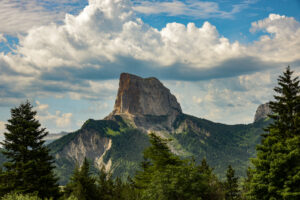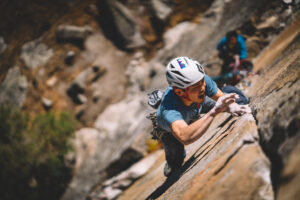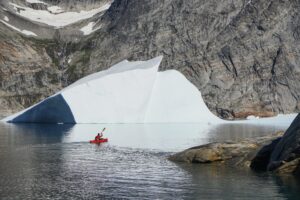The war in Ukraine has forced climbers, rowers, and trekkers whom we have written about in the past to abandon their adventures and focus on staying alive. Some have fled, some are currently fighting for their country. All of them, in one way or the other, are contributing to Ukraine’s cause.
Some foreign adventurers are also trying to help the besieged country, especially those from neighboring states, for whom the invasion has hit close to home. Here is a recap of what some familiar ExplorersWeb figures are doing.

Mikhail Fomin asks fellow climbers to donate for the Ukrainians who have been forced to change their climbing helmets for military ones.
The Ukrainians:
Alpomania’s CEO Valentyn Sypavin was in the Andes when the war broke. By the time he returned to Santiago, Chile, his son and wife had fled Ukraine for Germany. They met briefly in the Czech Republic. Since then, Sypavin has moved around, looking for a school for his son, while trying to solicit medicine from his many international contacts to send to Ukraine. His office in Kharkiv was destroyed by a rocket fired from Russia, just 40km away. Business had been going well: He had 15 clients booked for Everest, Lhotse, and Kangchenjunga this spring.

Valentyn Sypavin, on the summit of Everest, 2017. Photo: Valentyn Sypavin
Mikhail Fomin, from last year’s Annapurna III team, is safe with his family. During the first days of the war, they fled to Italy. The whereabouts of his two partners, Viacheslav Polezhaiko and Nikita Balabanov, are unclear. Their activity on social media is confined to sharing posts about fundraising initiatives, or from those seeking goods for the cause. Fomin himself is busy collecting funds. “Now it is time for many Ukrainian climbers to wear soldier’s helmets instead of super-lightweight BD or Petzl stuff and to protect Ukraine,” he wrote.
Oleg Ivanchenko of Extreme Guides, based in Odessa, is also sharing messages from his compatriots asking for logistical support. He supports a movement launched last week by Irina Galay to ban Russian climbers from joining expeditions abroad in places like Nepal. Galay is in western Ukraine, serving with the defence forces. It’s not appropriate for Russians to climb while their government is waging war, the NoPeaceNoClimb group argues. “All the Ukrainian climbers have canceled their expeditions, so should the Russians. As soon as the war is over, we will all…climb.”

Banner of the Nopeacenoclimb initiative.
Helping however they can
Sources in Ukraine have told ExplorersWeb that a significant number of Ukrainian athletes are actively fighting, but they are keeping discreet about it. Many others are doing their best to carry on working, despite the siege. They are trying to keep the country’s economy going somehow.
Early this year, we covered Alina Kosovska‘s landmark winter trek across the Carpathian Mountains. She has since joined the military effort near Kyiv. In between driving her country, hunting for generators and spare vehicle parts, she has remained active online. She is selling an online book about her trek to raise money for the defense effort. “I want [the book] to see the world somehow, even if I don’t live to win [the war],” she posted on Instagram.

Alina Kosovska has swapped her trekking poles for a rifle. Photo: Instagram
Foreign climbers
Many Eastern European nations bordering Ukraine and Russia are on guard. Says Lithuanian climber Saulius Damulevicius, “I never wanted to bear arms…But if an aggressor steps on our land, I must be ready to fight. Therefore, I joined the Lithuanian Riflemen’s Union.” Damulevicius has also been raising funds for Ukraine since the beginning of the conflict.

Medicines, one of the most requested supplies for Ukraine.
Medicine and supplies
Oswald Rodrigo Pereira of Poland has joined forces with Alex Txikon, his partner from the recent attempt on winter Manaslu. Txikon has organized a bus filled with supplies, medicine, and warm clothing provided by his sponsors. He drove to the Polish-Ukrainian border to drop off the supplies, then returned with refugees for whom an NGO has found hosting homes in Spain. Txikon has made four such trips so far.
Meanwhile, Pereira managed to cross into Ukraine and drop off some of the goods directly. “It felt like I was back in Warsaw 1939,” he wrote. Other climbers have been involved in similar initiatives, such as Damien Parisse of France.

Alex Txikon (third from left) oversees loading a bus with supplies for Ukraine. The bus then brings refugees back to Spain. Photo: Alex Txikon
Ocean rower Fiann Paul lives in Iceland, but he was born in Poland. He felt so connected to events in Ukraine that despite a lack of military training, he applied to go there to fight. He duly filled out an application through the embassy, and it was forwarded to the commander in charge of foreign volunteers. The commander took the time to write back, in broken English: “My friend, thank for apply, but we do not want to risk you ass you do not have any combat experience.” Instead, Paul is trying to help Ukrainian emigrés through his family in Poland.
Russians muzzled
Finally, Russian climbers who previously came out against the war have been ruthlessly silenced. Russia has declared Facebook and Instagram “extremist organizations” and banned them. Protesters can face up to 15 years in prison. Some had barely time to delete their posts before the platform was closed to them. “I hope for your understanding,” one of them wrote on social media just before the ban closed the platform down, “and I also hope you remember what was written here.”






